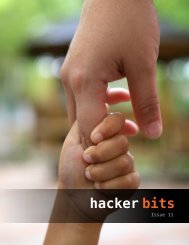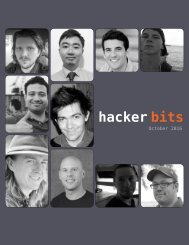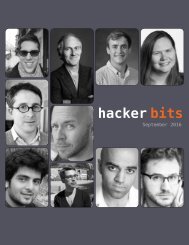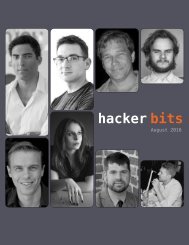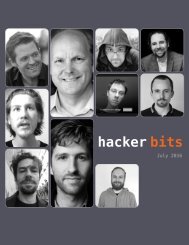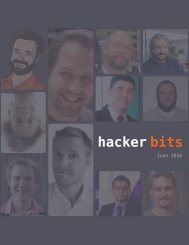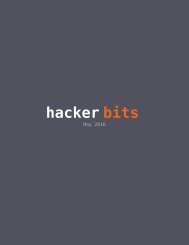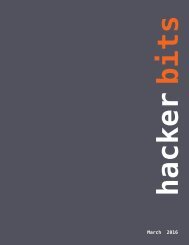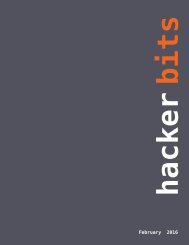Hacker Bits, April 2016
HACKER BITS is the monthly magazine that gives you the hottest technology and startup stories crowdsources by the readers of Hacker News. We select from the top voted stories for you and publish them in an easy-to-read magazine format. Get HACKER BITS delivered to your inbox every month! For more, visit http://hackerbits.com.
HACKER BITS is the monthly magazine that gives you the hottest technology and startup stories crowdsources by the readers of Hacker News. We select from the top voted stories for you and publish them in an easy-to-read magazine format.
Get HACKER BITS delivered to your inbox every month! For more, visit http://hackerbits.com.
You also want an ePaper? Increase the reach of your titles
YUMPU automatically turns print PDFs into web optimized ePapers that Google loves.
Programmers too focused on<br />
interesting tech is an anti-pattern<br />
that companies screen against.<br />
you completed in the past. The<br />
mistake that many engineers<br />
make on this question is to talk<br />
about a technically interesting<br />
side-project. Many programmers<br />
choose to talk about implementing<br />
a neural network classifier,<br />
or writing a Twitter grammar<br />
bot. These are bad choices<br />
because it’s very hard for the<br />
interviewer to judge their scope.<br />
Many candidates exaggerate<br />
simple side projects (sometimes<br />
that never actually worked), and<br />
the interviewer has no way to<br />
tell if you are doing this.<br />
The solution is to choose a<br />
project that produced results,<br />
and highlight the results. This<br />
often involves picking a less<br />
technically interesting project,<br />
but it’s worth it. Think (ahead<br />
of time) of the programming<br />
you’ve done that had the largest<br />
real-world impact. If you’ve<br />
written a iOS game, and 50k<br />
people have downloaded it, the<br />
download number makes it a<br />
good option. If you’ve written<br />
an admin interface during an<br />
internship that was deployed to<br />
the entire admin staff, the deployment<br />
makes it a good thing<br />
to talk about. Selecting a practical<br />
project will also communicate<br />
to the company that you<br />
focus on actual work. Programmers<br />
too focused on interesting<br />
tech is an anti-pattern that<br />
companies screen against (these<br />
programmers are sometimes not<br />
productive).<br />
6. Use a dynamic<br />
language, but<br />
mention C<br />
I recommend that you use a<br />
dynamic language like Python,<br />
Ruby or JavaScript during interviews.<br />
Of course, you should use<br />
whatever language you know<br />
best. But we find that many people<br />
try interviewing in C , C++ or<br />
Java, under the impression these<br />
are the “real’ programming<br />
languages. Several classic books<br />
on interviewing recommend that<br />
programmers choose Java or<br />
C++. At startups at least, we’ve<br />
found that this is bad advice.<br />
Candidates do better when using<br />
dynamic languages. This is<br />
true, I think, because of dynamic<br />
languages’ compact syntax,<br />
flexible typing, and list and hash<br />
literals. They are permissive<br />
languages. This can be a liability<br />
when writing complex systems<br />
(a highly debatable point), but<br />
it’s great when trying to cram<br />
binary search onto a whiteboard.<br />
No matter what language<br />
you use, it’s helpful to mention<br />
work in other languages. An anti-pattern<br />
that companies screen<br />
against is people who only know<br />
one language. If you do only<br />
know one language, you have<br />
to rely on your strength in that<br />
language. But if you’ve done<br />
work or side-projects in multiple<br />
languages, be sure to bring<br />
this up when talking to your<br />
interviewers. If you have worked<br />
in lower-level languages like C,<br />
C++, Go, or Rust, talking about<br />
this will particularly help.<br />
Java, C# and PHP are a problematic<br />
case. As we described<br />
in our last blog post, we’ve<br />
uncovered bias against these<br />
languages in startups. We have<br />
data showing that programmers<br />
using these languages in the interview<br />
pass at a lower rate. This<br />
is not fair, but it is the truth. If<br />
you have other options, I recommend<br />
against using these<br />
languages in interviews with<br />
startups.<br />
7. Practice, practice,<br />
practice<br />
You can get much better at<br />
interviewing by practicing answering<br />
questions. This is true<br />
because interviews are stressful,<br />
but stress harms performance.<br />
The solution is practice. Interviewing<br />
becomes less stressful<br />
with exposure. This happens<br />
naturally with experience. Even<br />
within a single job search, we<br />
find that candidates often fail<br />
their initial interviews, and then<br />
pass more as their confidence<br />
builds. If stress is something<br />
you struggle with, I recommend<br />
that you jumpstart this process<br />
by practicing interview stress.<br />
Get a list of interview questions<br />
(the book Cracking the Coding<br />
Interview is one good source)<br />
and solve them. Set a 20-minute<br />
timer on each question, and<br />
16 hacker bits






